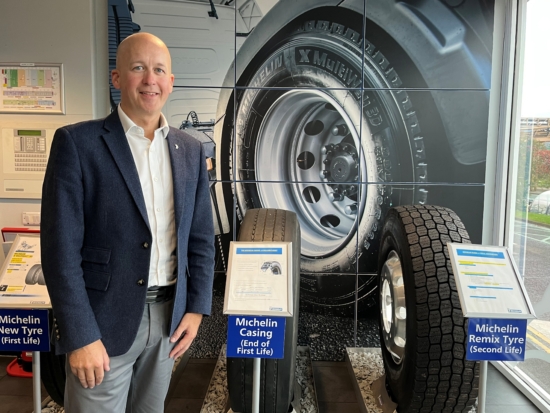Industrial tyres: Quality and durability are built-in sustainability arguments
 Andrew French, Michelin Tyre plc B2B sales director (Photo: Michelin)
Andrew French, Michelin Tyre plc B2B sales director (Photo: Michelin)
The term resilient tyres refers to a particularly durable sub-segment of the industrial tyres business, but it also neatly highlights the strengths of the especially business-to-business-orientated material handling sector. While industry observers often highlight the consistency of the wider commercial vehicle segment – especially truck tyres – material handling tyres have also remained stable in the face of adversity and are arguably just as critical to business and therefore national economies. In addition, the turmoil of recent years has led to significant changes in the distribution and service side of the material handling tyre business. That’s why October’s issue takes a closer look at industrial tyres in general and material handling tyres in particular.
The section begins with an interview with Andrew French, B2B sales director at Michelin Tyre plc, conducted at the company’s Campbell Road, Stoke-on-Trent headquarters on the sidelines of a tour of the company’s truck tyre retreading facilities. With that in mind, we began with questions more generally related to the business-to-business tyre segment, before discussing the integration of Camso/Solideal and industrial tyres.
Currently, most of the retread production that takes place at Campbell Road is destined for use on UK fleets. Specifically, anywhere between 50 and 75 per cent of the retreaded tyres remanufactured in Stoke end up being fitted domestically – something that is a reflection of the kind of local-for-local philosophy that ESG-conscious fleets are increasingly receptive to.
So could retreading also become popular in the industrial tyre segment? Andrew French wouldn’t be drawn on whether there are any official plans along these lines, but – speaking more broadly and hypothetically – he did agree that some industrial tyres have the potential to follow the multi-life strategy already well established in the truck and bus segments.
Meanwhile, elsewhere in Michelin Group-owned ATS Euromaster, in mid-September sales director Jason Chamberlain, added the role of commercial director at TrucTyre to his remit. Commenting on his appointment, Chamberlain said he wanted to deploy “the strength and experience of both companies to provide outstanding customer value for Car, LCV and HGV sectors.” Previously those roles had been separated out into car and commercial vehicle operations. What’s not mentioned on that list is the beyond-road sectors such as industrial agricultural and OTR tyres.
The Camso product line-up which includes solid, pneumatic and container handling industrial tyre products “really complements” the wider Michelin range – Andrew French
Industrial tyre service is taken care of by the Solideal-on-Site (SOS) operation that joined the UK business roughly four years ago as part of Michelin Group’s earlier acquisition of Camso. According to Andrew French, that integration has gone well, with Camso staff taking on Michelin contracts and being re-energised by the career development opportunities they bring.
Product-wise, the Camso range which includes solid, pneumatic and container handling industrial tyre products reportedly “really complements” the wider Michelin range. The result is a broad and more competitive offer, according to French.
As we have seen, industrial tyres, like truck tyres, represent a business area that has demonstrated greater resilience to adverse pressures such as the pandemic. But are there any other similarities between truck tyres and industrial tyres?
Firstly, in terms of market development truck tyre volumes didn’t fall off the metaphorical demand cliff like car tyres did, but – also similarly to truck tyres – they aren’t necessarily at peak volume levels. Truck tyre volumes, for example, are said to be at 2018 levels. For their industrial tyre demand volumes are said to be “similar”.
There are also comparisons to be drawn between the service sides of the two business segments. Truck tyres are well-known for their lifetime and sustainability arguments. The industrial tyres side of the business has the opportunity to promote its offer on similar grounds – namely: quality, durability and therefore built-in sustainability as well as attractive total cost of ownership performance.

 PublicDomainPictures; Pixabay
PublicDomainPictures; Pixabay
Comments